
In today’s digital era, technology has become an inseparable part of daily life, from business transactions and government procedures to personal communications. While digital transformation offers significant benefits, it also presents major challenges related to privacy, security, and data protection. Among these challenges, digital authentication stands out as a crucial factor in securing electronic transactions.
In this context, electronic signatures play a vital role in ensuring the credibility of digital documents and safeguarding personal data at every stage of online interactions.
An electronic signature (e-signature) is a digital tool used to verify the identity of the signer and authenticate documents or electronic messages. It incorporates encryption technologies that prevent modifications or tampering after the document has been signed.
In many cases, electronic signatures are legally equivalent to handwritten signatures, making them valid in legal and administrative documents. With an electronic signature, individuals and organizations can sign contracts, agreements, and legal documents online, eliminating the need for printing, scanning, or in-person presence.
With the growing adoption of digital systems, businesses and governments worldwide are integrating electronic signatures to improve efficiency and streamline documentation processes.
In Iraq, electronic signatures are now officially recognized for government and commercial transactions, helping to:
✅ Speed up processes
✅ Reduce bureaucratic obstacles
✅ Ensure the security and validity of digital documents
However, simply having digital documents is not enough—they must be secured to prevent unauthorized modifications. Electronic signatures provide legal credibility similar to traditional signatures, ensuring the integrity of official and business-related documents.
With the rapid increase in digital transactions, personal data has become highly vulnerable to cyberattacks such as hacking, identity theft, and data breaches.
🔐 How do electronic signatures protect personal data?
By using strong cryptographic methods, electronic signatures safeguard personal data from cyber threats, ensuring that all signed documents remain secure, unaltered, and verifiable.
A key factor that makes electronic signatures indispensable is their legal acceptance. Many countries, including Iraq, have updated laws to officially recognize digital signatures as legally binding.
Iraq’s Electronic Transactions Law No. 78 of 2012 establishes that:
✔ Electronic signatures hold the same legal authority as handwritten signatures.
✔ Digitally signed documents can be used in courts and official disputes.
✔ Government and private entities can rely on e-signatures for contracts and approvals.
By integrating electronic signatures into Iraq’s legal framework, the government has taken a crucial step towards full digital transformation, ensuring transparency and legal credibility in all digital transactions.
One of the most debated topics in today’s digital landscape is data privacy. As the volume of online transactions continues to rise, protecting sensitive information has become a critical concern.
🛡 How do electronic signatures protect data privacy?
✅ They verify the signer’s true identity, ensuring that no unauthorized party can manipulate the document.
✅ They create an encrypted record, making it impossible to modify a document without detection.
✅ They ensure that personal information remains confidential, preventing exposure to hackers or unauthorized users.
The audit trails associated with electronic signatures provide a secure record of every transaction, ensuring that all modifications, approvals, and signings are fully traceable and legally compliant.
Electronic signatures have become a core part of digital transactions across various industries:
📌 In the Government Sector
📌 In the Private Sector
Before e-signatures, signing documents required physical meetings, extensive paperwork, and delays. Now, with digital signatures, businesses and governments can sign and process documents instantly, improving efficiency and reducing operational costs.
TwoKeyOk is a leading electronic signature platform in Iraq, offering secure and legally recognized digital authentication services.
🚀 How TwoKeyOk enhances security and compliance:
✔ End-to-end encryption to protect signed documents.
✔ Compliance with international security standards (ISO, WebTrust).
✔ Multiple layers of authentication to prevent unauthorized access.
✔ Support for electronic sealing and encrypted email signing.
By integrating advanced security measures, TwoKeyOk helps individuals and businesses secure their transactions, reduce fraud risks, and enhance digital trust in Iraq.
Electronic signatures are no longer a luxury—they are now a necessity for modern digital transactions. With secure authentication, legal compliance, and data protection, electronic signatures contribute to a safer and more efficient digital environment.
With legal backing and technological advancements, Iraq is moving toward a fully digital future, where TwoKeyOk plays a key role in ensuring trust, security, and transparency in all online transactions.
🚀 Ready to embrace the future of secure digital authentication? Start using TwoKeyOk today and experience the next level of secure and compliant e-signatures in Iraq!